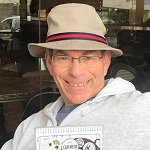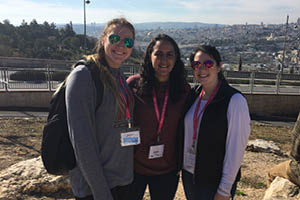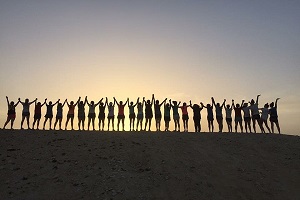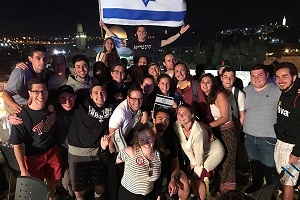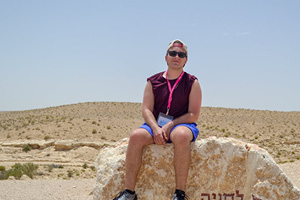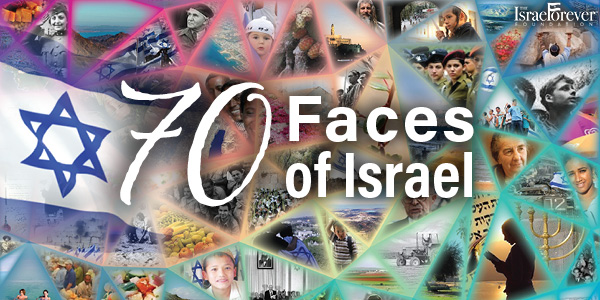For Once, I Didn't Feel Like a Minority
By Bob Canter
ISRAEL'S UNIQUE ROLE IN THE PRESERVATION OF THE JEWISH COMMUNITY
After thinking about it for many years, my wife and I made our first trip to Israel in July, 2008. It was Israel's 60th Anniversary year, and there were many Jewish organizational trips to the Holy Land to celebrate the milestone.
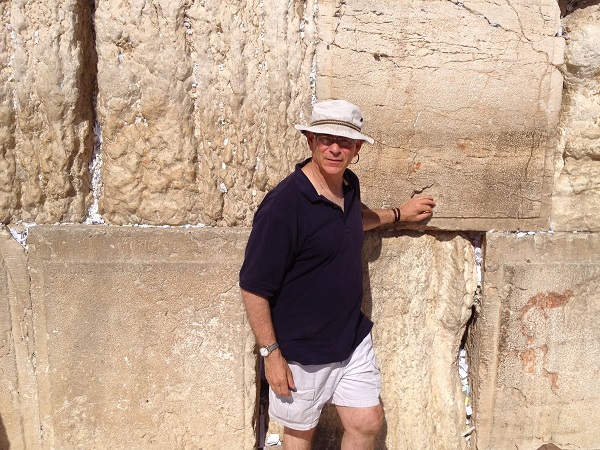
Ours was with our synagogue, a Reform congregation in the San Francisco Bay Area. It was not inexpensive, but we had never been to Israel, and with our rabbi's encouragement we decided to take the plunge. A number of our close friends decided to go also. There were about 20 of us in the group.
The trip was spectacular. We spent three full days in Jerusalem, primarily in the Old City and stayed at the wonderful Mount Zion Hotel. I stood in awe before the Western Wall, trying to fully comprehend that I was actually touching something thousands of years old.
I swam in three bodies of water – the Dead Sea, the Sea of Galilee, and the Mediterranean. We visited Masada, explored the ancient streets of Tsfat and other cities and towns in the Galilee. We enjoyed the shopping and cuisine and excitement of Tel Aviv, along with its museums, cafes and night life.
In spite of what so many people told us, never once did we feel unsafe. We walked everywhere with a full sense of safety and security. Young Israelis in their army uniforms where everywhere. It's hard to describe, but there is a natural buzz of excitement about Israel, and enough English is spoken there that you feel comfortable, even if your level of Hebrew fluency is low.
The trip was so magical and awe inspiring that my wife suggested, in all seriousness, that we move there. For a time, we considered it, including attending several orientation sessions held by Nefesh B'Nefesh.
I knew there was something special about Israel, but struggled to capture and express that special feeling in my own words. Try as I might, I could not hit on the right phrase. But someone else who was on the trip did, and as soon as he said it, his statement captured my sentiment perfectly.
About a month after we returned from our trip, a graduate student from UC Berkeley contacted the Temple office. She was working on a paper analyzing the American Jewish community’s attitudes toward Israel, and asked if there were any congregants she could interview. The Temple staff contacted several of us who had been on the Israel trip, and two of us – me, and a doctor who was one of the founding members of the congregation – volunteered to be interviewed.
We met in the synagogue library and the student began a long list of questions. After a lengthy session, she finished with a final question: “If you could name one thing, something about the trip that was especially important or meaningful to you, what would it be?”
The doctor responded immediately. He took a deep breath and said: ”For once, I didn't feel like a minority.”
BOOM! That was it! THAT was the sentiment I was looking for. Talk about a revelation. I immediately identified with that statement. After that, the pieces all fell into place.
I seconded his statement and told the student that was my feeling as well. For me, this statement perfectly captured the special nature of Israel. There, I was no longer a religious minority. I didn't have to explain why I don't celebrate Christmas or Easter. I could wear the star of David around my neck outside of my shirt instead of inside, and not worry about curious stares.
In Israel, you're saturated in Judaism; you can't escape it. It's all around you – and that's the point. It embraces you; it envelopes you in a feeling of safety and security, where you don't feel... different from everyone else. I was in a country both ancient and modern, immersed in Judaism. Exciting. Exhilarating. Liberating. I felt free, free to be me... and I didn't have to explain who I was.
But mostly, it was about feeling safe. A whole country, small but mighty, where you don't have to worry about being Jewish. A nation created on a foundation of Judaism.
You often hear that Israelis are not particularly religious, and in general that is true. I always wondered about that. It bothered me, and when I first heard this I had trouble believing it. Israelis fought and died to secure their new country, and in many ways they are still fighting for it. So how could it possibly be that Jews who fought so hard for the creation of a Jewish State are not religious?
The answer came to me in a discussion with our daughter's father-in-law, David, a native Israeli who served in the IDF and defends Israel most passionately and articulately. He set it out for me in that direct, no-holds-barred bluntness that is so typical of the Israeli style.
“When you go to work in America,” he began, “there may be a few other Jews in the office, but probably not very many. And when you go out shopping at the local shopping mall or go to the movies, there are only a very few other Jews there; it's possible you're the only one, right?”
I agreed.
He continued: “And when your kid goes to play on his soccer or baseball team, there is a very good chance he is the only Jewish kid on the team. And when your kids go to school – unless you send them to a Jewish day school – most likely there are very few other Jewish kids in their class.”
“But,” David went on, “In Israel, when I go to work, everyone in the office is Jewish. When we go to the shopping mall, or to the movies, everyone there is Jewish, like us. When our boys go to play soccer, all of his mates and even the coach, they're all Jewish. And when our kids are in school, all of their classmates are Jewish, as are their teachers.”
“In America, Jews are only Jewish on the weekends, or maybe during a religious holiday. American Jews need to go to the synagogue to feel Jewish, because you live in a non-Jewish country with a non-Jewish environment.”
“But in Israel, it's different. Here, we are Jewish all the time, seven days a week. At work, at school, on vacation, shopping, a trip to the doctor, it makes no difference. The waiter in the restaurant, the check-out girl in the supermarket, the police officer, the teller at the bank, everyone, all Jews. We are Jewish all of the time, morning to night. So, Bob, that is why most Israelis are not religious – we live our Judaism every day, not just on the weekends. I don't need to go to a synagogue to feel Jewish, like you do in America.”
I listened intently as David spoke, absorbing every word. It brought the message home to me, very clearly and forcefully. This made perfect sense because, well, it so accurately described the contrast between American and Israeli Jewry.
American Jews live in a two-part assimilated society: Our everyday, Monday through Friday world, where we are just “Americans,” and our weekend world, where – for some of us – we don our Jewish identities.
I feel “more Jewish” on a Saturday morning when I'm attending a bar or bat mitzvah ceremony at our synagogue, and I most definitely feel “more Jewish” when I'm teaching in my 5th Grade classroom at our temple's Religious School than I do during the other times of the week. And of course, I feel “more Jewish” at Rosh Hashanah and Yom Kippur services, or during Simchat Torah, or other times when I'm at the synagogue for a meeting, social event or other reason...
...when I'm in the synagogue. But outside the synagogue, I feel, well, not so Jewish. Understand, I don't stop being Jewish outside of the synagogue. I'm Jewish 24 hours a day, wherever I am; it's my religion.
But the issue is not about being Jewish, it's about feeling Jewish.
In our increasingly assimilated, secular American society, we tend to keep our religion separate and apart from our workaday world. I may be Jewish all of the time, but I do not feel Jewish all of the time.
Photo by Racheli Ziskind Sabo
This is the difference between being Jewish in America and Jewish in Israel. In the United States, I am an American; Judaism is my religious faith. In Israel, Judaism is who you are; am yisroel, part of the Jewish People.
My wife and I never did move to Israel, but in 2009 our daughter did. She married a native Israeli and our granddaughter was born in Israel, so now we have a direct family connection to the land. Our daughter is an Israeli citizen, and our granddaughter is growing up in Israel and calls it home. We could not be prouder.
One of the most eloquent expressions about a Jew's connection to Israel was written by by Yehuda HaLevi. Born in Toledo, Spain near the end of the 11th century, he was a rabbi, philosopher and physician. In his poem, “My Heart is in the East,” Yehuda HaLevi says, “libi ba’mizrach ve’anochi be’sof ma’arav” – “My heart is in the east, and I in the uttermost west.” He feels separated from his heart, his spirit. His body is one place, but his spirit, his heart, is in Israel.
This simple line is one of the best examples of how Israel resonates with Jews around the world. For many American Jews, the true essence of much of our Judaism remains dormant, sometimes even suppressed. But when you arrive in Israel, those dormant feelings are lifted; your spirit is set free. You are free to be “as Jewish as you want to be,” and you don't have to worry one bit about who sees it or hears it – it surrounds you. In Israel, we are safe; we are home. And you don't have to feel like a minority anymore.
Recommended for you:
Israel is both more (and less) than people imagine. It is her complexity that makes her beautiful
Next time someone asks you, what is Israel like? Tell them, “She has 70 Faces”
About the Author
